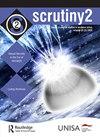Mexican Migrants and the Vocabulary of Transnationalism
IF 0.1
0 LITERATURE
Scrutiny2-Issues in English Studies in Southern Africa
Pub Date : 2019-01-02
DOI:10.1080/18125441.2019.1650819
引用次数: 1
Abstract
ABSTRACT This article examines elements of the vocabulary of migration in one film and two works of literature, considering how representations of Mexican migrants and their migrations can either support or resist anachronistic nationalist frameworks of citizenship. The first example, from the animated film Coco (dir. Lee Unkrich and Adrian Molina. Pixar/Walt Disney, 2017), focuses on the trope of border control and the depiction of a border crossing as characters from the land of the dead attempt to “cross” into the land of the living on the Day of the Dead. The scene’s light-hearted tone serves to underscore the process of normalisation of border control and the extreme forms of state power exercised at the border. The second example draws from a more solemn narrative of border crossing, related in Graciela Limón’s The River Flows North (Houston: Arte Público, 2009), to look closely at representations of the border itself and the agency of migrants in the crossing. Finally, I look to Sandra Cisneros’s short story “Woman Hollering Creek” (Woman Hollering Creek and Other Stories. New York: Vintage, 1991) to explore the migration of the main character across multiple metaphorical borders. Each example highlights the power of language to either constrain or promote migrant empowerment and to extend the effective deployment of the vocabulary of transnationalism into discussions of political agency and rights.墨西哥移民与跨民族主义词汇
摘要本文考察了一部电影和两部文学作品中移民词汇的元素,考虑了墨西哥移民及其移民的表现如何支持或抵制不合时宜的民族主义公民框架。第一个例子来自动画电影《可可》(导演:Lee Unkrich和Adrian Molina。皮克斯/华特迪士尼,2017),重点讲述了边境控制的比喻,以及在亡灵节,来自亡灵之地的人物试图“穿越”到活人之地时对越境的描述。这一场景轻松的基调突显了边境管制的正常化进程以及在边境行使的极端形式的国家权力。第二个例子借鉴了Graciela Limón的《北流河》(休斯顿:Arte Público,2009)中关于越境的更为严肃的叙述,以仔细观察边境本身和移民在越境中的代理。最后,我看了Sandra Cisneros的短篇小说《女人霍林溪》(Woman Hollering Creek and Other Stories,New York:Vintage,1991),探讨主人公跨越多个隐喻边界的迁移。每一个例子都强调了语言的力量,它可以限制或促进移民赋权,并将跨民族主义词汇有效地运用到政治机构和权利的讨论中。
本文章由计算机程序翻译,如有差异,请以英文原文为准。
求助全文
约1分钟内获得全文
求助全文
来源期刊
CiteScore
0.50
自引率
0.00%
发文量
10
期刊介绍:
scrutiny2 is a double blind peer-reviewed journal that publishes original manuscripts on theoretical and practical concerns in English literary studies in southern Africa, particularly tertiary education. Uniquely southern African approaches to southern African concerns are sought, although manuscripts of a more general nature will be considered. The journal is aimed at an audience of specialists in English literary studies. While the dominant form of manuscripts published will be the scholarly article, the journal will also publish poetry, as well as other forms of writing such as the essay, review essay, conference report and polemical position piece. This journal is accredited with the South African Department of Higher Education and Training.

 求助内容:
求助内容: 应助结果提醒方式:
应助结果提醒方式:


